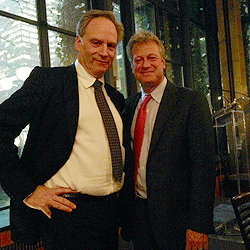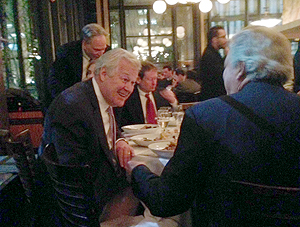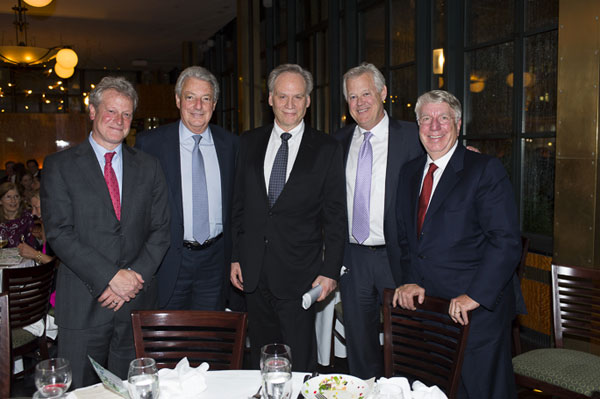The "relations" part of PR, which deals with engagement and public dialog, is the special mark of the profession, said Harris Diamond, recipient of the PRSA Foundation's Paladin Award last night at New York's Bryant Park Grill.
 Harris Diamond with Weber Shandwick CEO Andy Polansky at the Palladin event. Photo: Kevin McCauley Harris Diamond with Weber Shandwick CEO Andy Polansky at the Palladin event. Photo: Kevin McCauley |
The former Weber Shandwick CEO said his 25-plus years of PR/PA experience helped him prepare to helm Interpublic’s McCann Worldgroup advertising agency flagship.
The McCann job provided Diamond the opportunity to understand more deeply why the PR perspective is important in today's world where various marketing disciplines must work together.
Marketers need to find out every thing they can about consumers, according to Diamond: "They need to understand the legislative and regulatory context, as well as the specifics of purchasing behavior, because consumer brand considerations now entail corporate, social, political and ethical ones as well."
Clients must reach people across multiple platforms, both digital and otherwise, that are coordinated and collaborative reinforced, he said.
To Diamond, "the imperative to deliver thinking in a more integrated way is key to the success for all in the marketing services sphere."
He noted that many brand discussions begin with what can be said, even before crafting what will be said.
"This is something about he PR background that enables you to think beyond and more broadly than selling a product, to take a look and understand the corporate and marketing relevance of the issues that society is debating -- issues ranging from genetically modified foods, to ingredients in packages to when it is even appropriate to advertise or what is appropriate to advertise," he said.
Privacy, information are keys
 Weber Shandwick chairman Jack Leslie talks with Interpublic CEO Michael Roth. Photo: Kevin McCauley Weber Shandwick chairman Jack Leslie talks with Interpublic CEO Michael Roth. Photo: Kevin McCauley |
The McCann CEO noted that the technology revolution, combined with the rise of Big Data, gives companies more ways to target and reach consumers more personally, efficiently and effectively.
The marketing world, however, stands "on the cusp of change, re-balancing he positive sides of technology with abuse."
Diamond sees concern over privacy and information as the key issue during the next decade. While the current focus is on the National Security Agency and other federal entities, consumers eventually will confront the reality that corporations are compiling tons of data about them.
Today's companies are collecting aggregate information, "so nobody in theory knows anything specific about individuals."
That situation will change, and if not addressed properly and in time, it could become a crisis.
Diamond believes tension over data between consumers and corporations creates an opening for PR pros expert in explanation and discourse to bring both sides together.
"The PR industry has an opportunity to become the leader in setting up rules of privacy and reassuring the public by explaining how companies define their privacy philosophies and helping to establish reasonable and reasoned limits on what they can do with the information they gather," said Diamond.
 PRSA Foundation president Lou Capozzi Photo: Bruce Wodder PRSA Foundation president Lou Capozzi Photo: Bruce Wodder |
PR people must concentrate all their mediating skills and work closely with marketing, corporate and advertising communications partners.
 Harris Diamond Photo: Bruce Wodder Harris Diamond Photo: Bruce Wodder |
"If we do, we will ultimately demonstrate why the world skills and perspectives of PR are of increasing value in an expanding multi-platform marketing services world," concluded Diamond.
 Polansky, Roth, Diamond, Leslie, Capozzi Photo: Bruce Wodder Polansky, Roth, Diamond, Leslie, Capozzi Photo: Bruce Wodder |
Weber Shandwick CEO Andy Polansky introduced Diamond, chronicling Diamond's career that began as a peanut vendor at Yankee Stadium.


 Abandon traditional content plans focused on a linear buyer progression and instead embrace a consumer journey where no matter which direction they travel, they get what they need, stressed marketing pro Ashley Faus during O'Dwyer's webinar Apr. 2.
Abandon traditional content plans focused on a linear buyer progression and instead embrace a consumer journey where no matter which direction they travel, they get what they need, stressed marketing pro Ashley Faus during O'Dwyer's webinar Apr. 2. Freelance marketers and the companies that hire them are both satisfied with the current work arrangements they have and anticipate the volume of freelance opportunities to increase in the future, according to new data on the growing freelance marketing economy.
Freelance marketers and the companies that hire them are both satisfied with the current work arrangements they have and anticipate the volume of freelance opportunities to increase in the future, according to new data on the growing freelance marketing economy. Home Depot's new attempt to occupy two market positions at once will require careful positioning strategy and execution to make it work.
Home Depot's new attempt to occupy two market positions at once will require careful positioning strategy and execution to make it work. Verizon snags Peloton Interactive chief marketing officer Leslie Berland as its new CMO, effective Jan. 9. Berland succeeds Diego Scotti, who left Verizon earlier this year.
Verizon snags Peloton Interactive chief marketing officer Leslie Berland as its new CMO, effective Jan. 9. Berland succeeds Diego Scotti, who left Verizon earlier this year.  Norm de Greve, who has been CMO at CVS Health since 2015, is taking the top marketing job at General Motors, effective July 31.
Norm de Greve, who has been CMO at CVS Health since 2015, is taking the top marketing job at General Motors, effective July 31.


 Have a comment? Send it to
Have a comment? Send it to 
No comments have been submitted for this story yet.